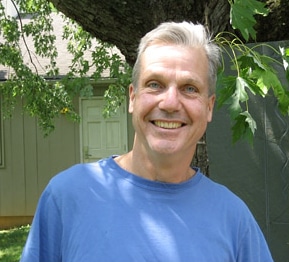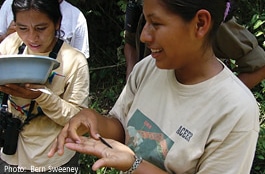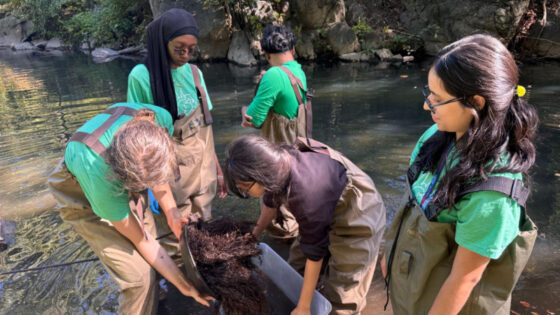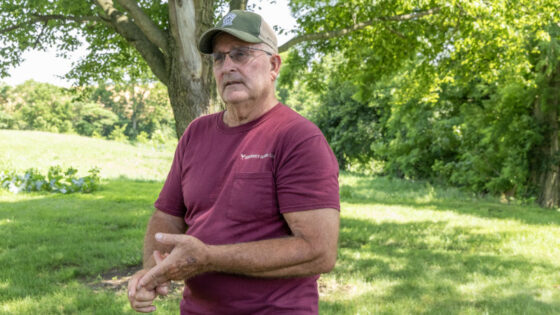
“Gracias por esta oportunidad,” wrote Gabrielle Gutierrez, a biology teacher at the Área de Conservación Guanacaste in northern Costa Rica very near the Stroud Center’s tropical stream laboratory at the Maritza Biological Station…“Thank you for this opportunity.”
Representatives from Central and South America will test drive the Spanish-language version of the popular Leaf Pack in a fall workshop to be held at the Stroud Water Research Center in October, 2008. Gabrielle was writing to accept our invitation to participate in a weeklong workshop on fresh water at the Center in October. She is part of a group of 15 teachers, professors, conservation workers, and government officials who will be coming to the Avondale campus from Central and South America — and Fort Worth, Texas — to take the Stroud Center’s new Spanish-language version of its Leaf Pack manual for a test drive.
“This is exciting,” said Jamie Blaine, Stroud Center research associate and a key driver behind the project. “Leaf Pack is a wonderful teaching tool and a simple way for people to monitor their local streams. Our educators have used it for almost two decades, and earlier this year we had it translated into Spanish. Being able to reach out to 500 million Spanish speakers around the world will do a lot to promote a freshwater stewardship movement across many borders.”
The participants will go home with a Leaf Pack Kit, and they have committed to sponsor a workshop in their communities within six months of their return. “The idea,” said Blaine, “is that these 15 people will become the first ambassadors whose goal is to spread Leaf Pack across Central and South America.”

The program could not come at a more auspicious time. Fresh water is a global issue receiving global attention from global institutions — including the United Nations, which set a Millennium Development 2000 Goal to “reduce by half the proportion of people without sustainable access to safe drinking water.” With thousands of organizations working on freshwater issues, there is a need for a simple and effective tool that people can use to understand and monitor their sources of fresh water, educate their communities about the impact of land use on water quality, and discuss their findings with others around the world. Leaf Pack is that tool.
A Brief History of Leaf Pack
Scientists and educators at the Stroud Center developed the Leaf Pack in the early 1990s based on scientific procedures they had used for many years. The program involves creating an artificial leaf pack (dry leaves in a mesh bag) and placing it in the stream for three to four weeks then, examining the pack to determine the number and type of aquatic insects which indicates the level of stream health and water quality. About 10 years ago, Stroud educators launched the Leaf Pack Network®, an internet-based network on which teachers, students and others can share data on the conditions of their local streams.
The Leaf Pack Experiment Kit is produced and marketed nationally by the The Leaf Pack Experiments Stream Ecology Kit has been a highly successful and a widely used curriculum supplement in schools across the country since 1997. The Center hopes to launch its Spanish-language version based on the same concept soon after the fall pilot workshop. LaMotte Company of Chestertown, MD, which specializes in educational products. The kit is a popular freshwater education product and it has been distributed to science teachers across the commonwealth of Pennsylvania. Additionally, thousands of students and teachers, from as far away as Kenya, now post their findings on the Leaf Pack Network®.
Until this year, however, the kit was only available in English. With the vast number of Spanish speakers in the world — and particularly in Latin America, where the Stroud Water Research Center has been involved through its program at the Maritza Biological Station since 1989 — a Spanish translation was an obvious next step — both to further the Center’s goal to make the Leaf Pack a global tool for environmental education and stream monitoring and to reinforce the Stroud Center’s ongoing work in Central and South America.
The Fall Workshop
Workshop participants must be associated with an educational institution, conservation organization or municipal government that supports their attendance and is committed to implementing the Leaf Pack program in its region. The participants include scientists, educators, forest engineers and policy makers from EARTH University, Pitzer College’s Firestone Center for Restoration Ecology, Costa Rica’s National Power and Light Company and its Water and Sewage Department, the Área de Conservación Guanacaste in Costa Rica, University of Georgia-Costa Rica, and Friends of Osa, as well as Universidad Rafael Landivar in Guatemala, the Amazon Center of Environmental Education and Research and the Association for the Conservation of the Amazon River Basin in Peru. In addition the director of a school in Fort Worth, Texas will attend, as will Rafa Morales of the Associación Centro de Investigación Stroud, the umbrella organization for the Stroud Center’s research and education activities in Central and South America.
A Proven Educational Tool
The Leaf Pack Kit is a proven educational tool that enables students to make connections between activities in their watersheds and the health of their streams. It is also a simple monitoring device that lets people quickly assess the presence and abundance of macroinvertebrates, which provide the early-warning system for stream health.
Leaf Pack is easy to use, easy to understand and easy to convert into a practical dataset. Over the last several years thousands of people have used the kits and posted their findings on the network. And many have used the experience to explore more broadly and deeply into the life of their water sources — by having community elders tell oral histories of their streams, for example, or by comparing their stream conditions with those of people who live far away. Some groups use this tool to work in the community and lobby for streamside restoration. Others make data available to conservation groups that are considering restoration projects. Putting these tools in the hands of individuals empowers them to become involved in community issues, and it fosters communication within and between communities.
In a world in which there is a great chasm in the transfer of knowledge, Leaf Pack enables people to build bridges from the research laboratory to their own communities, to transcend barriers of language, culture and level of education, and to make the connection between the health of the water they consume and the condition of the land on which they live.
“Thanks a lot for giving me this opportunity,” wrote Guido Saborio, Scientific Director of Friends of the Osa in Costa Rica. “I am really excited to learn about your program and then start to work with the local schools.”



